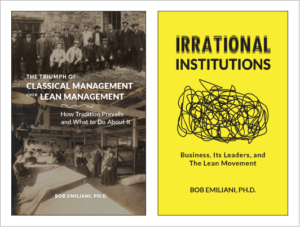Mark Graban recently wrote a blog post that reflects the current thinking of many Lean movement leaders and influences: “It’s Hard to Ask Leaders to Change the System in Which They’ve Risen and Excelled.” The “system” in question is the management system and culture of the company or companies that leaders have worked in. Unfortunately, the “system” is much larger than any one company’s management practice or culture.
The “system” is a vast interconnected network of preconceptions that span eight categories: economic, social, political, historical, philosophical, legal, business, and spiritual. These preconceptions don’t just serve to passively maintain the status quo, they are used as the truthful basis for vigorously defending and conserving past successes built up over thousands of years. If one truly empathizes with leaders, they would understand that leaders perceive there to be far more at stake than simply changing the management practice or company culture.
The position of leader, coupled with the eight categories of preconceptions, vests one’s authority. This can be expressed by the simple formula, α > λ, where α is “authority” and λ is “Lean.” Authority passively preserves and vigorously defends the status quo such that Lean is overwhelmed and unable to take root in its full form. Lean management is either summarily rejected by leaders or permitted by leaders to exist for a time as “Fake Lean” for reasons of expediency. Changing the system in any context, small (company microeconomy) or large (global macroeconomy), is not important to leaders. And, therefore, it makes no sense to focus on changing leaders’ behaviors.
In cases where Lean transformation has been successful, these are more appropriately understood to be happy accidents. Few will admit to this reality because it does not serve one’s interests. While happy accidents are welcomed, the formula α > λ remains in force. However, it is slightly weakened to allow Lean management to exist in the desired form, but usually for only a period of time after which the full strength of α > λ reasserts itself. This occurs with the inevitable changes in leadership or ownership.
Lean management has difficulty competing because it does not offer a coherent explanatory framework that can guide leaders to a new way of thinking and doing things; a complete explanatory framework capable of disrupting the vast interconnected set of established economic, social, political, historical, philosophical, legal, business, and spiritual preconceptions. Social learning, an analog form of social media, transmits these preconceptions from one generation of leaders to the next. The preconceptions are sticky because together they produce a workable conceptual blueprint for the conduct of business affairs. The ideology of classical management, embedded in authority, α, is strong, while the ideology embedded in Lean, λ, is weak.
Business leaders are the heroic defenders of the eight categories of preconceptions. Since 1988, the Lean movement’s path has been one of deterrence: “the action of discouraging an action or event through instilling doubt or fear of the consequences.” Despite our hopes otherwise, classical management is not deterrable. Lean is seen by leaders as a menace and so the way they contain it is to bureaucratize it; to suffocate it. The widespread confusion about what Lean is, the improper understanding and use of Lean tools, the plethora of bad information, incompetent consultants, coaches, and trainers, and Lean’s inability to appeal to laborers and the wider public give added life and expanded credibility to classical management. The working theory of classical management is simpler and has been unified over centuries, while Lean management’s working theory is complicated and has yet to be unified.
The conflict between management systems is a proxy for a much larger conflict. It is clear that classical management is no longer right for the times we live in. It hasn’t been right since the dawn of the Information Age soon after World War II. Yet, classical management has prospered in the 75 years since then. However, it seems likely that classical management will one day collapse from its many and growing weaknesses. Lean people need to be patient. But they also need to understand the larger system of authority, α, and the interconnected categories of preconceptions — economic, social, political, historical, philosophical, legal, business, and spiritual — that give classical management its endurance and power. The two books shown above are your resources for learning the larger system that Lean is up against. Broadening your thinking will broaden the results that the Lean movement hopes to achieve.

